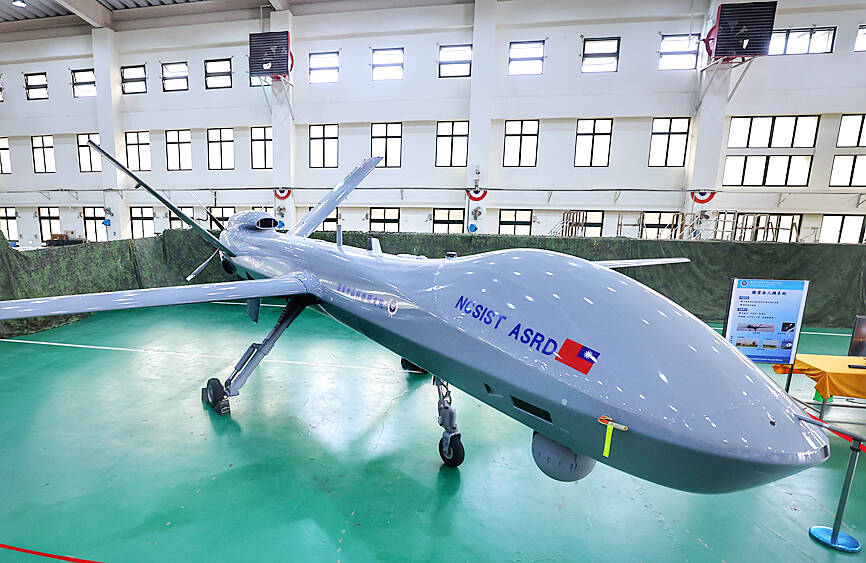A planned visit by representatives from US defense contractors is a sign of mutual trust between Taipei and Washington as US law stipulates that only allies can participate in the US defense supply chain, experts said yesterday.
About 25 representatives are to travel to Taiwan early next month to discuss the joint production of drones and ammunition, the Nikkei reported on Tuesday, citing US Taiwan Business Council president Rupert Hammond-Chambers.
The industry representatives would be led by former US Marine Corps Forces Pacific commander Steven Rudder, the Japanese paper cited Hammond-Chambers as saying.

Photo: CNA
They are also to meet with President Tsai Ing-wen (蔡英文) during their stay, it said.
The trip is meant “to promote defense industry cooperation with Taiwan,” the newspaper quoted Hammond-Chambers as saying.
Taiwan is interested in airborne, surface and submarine drones, as well as ammunition, he said.
The newspaper reported that Washington is open to the idea of coproduction arrangements, because US contractors are struggling to fill a backlog of orders.
A Taiwanese industry representative yesterday confirmed the visit to the Central News Agency.
It would be the first large delegation from the US defense industry to visit the nation since 2019.
The Taiwan-US Defense Business Forum was held in 2018 and 2019, bringing many representatives from the industry to Taiwan, but it was either held online or canceled over the past three years due to the COVID-19 pandemic.
The visit would allow direct communication on how to ensure munitions supply, but the companies would need authorization from the US government to jointly produce weapons overseas, said Chou Yu-ping (周宇平), a retired air force colonel from the Air Missile Defense Command.
“From a very high-level perspective, we think that coproduction arrangements make sense, but we need to take a look at them on a case-by-case basis, and it has to be at the request of US industry,” the Nikkei quoted a senior official in the US administration as saying.
However, the Taiwanese military has its own process for evaluating compatibility and uses US models as reference, so it would take some time to determine what would come of this visit, Chou said.
The US has supplied Ukrainian forces itself and through NATO allies, said Shen Ming-shih (沈明室), acting deputy chief executive officer for research at the Institute for National Defense and Security Research.
On the other hand, Taiwan’s geography would make it difficult to supply in the event of a blockade, Shen said.
While munitions could be stored in the Philippines and Japan, it would be more important to work with Taiwan to build domestic production capacity in advance, he said.
Doing so would extend Taiwan’s combat endurance, while also reducing costs and deepening the security partnership between Taiwan and the US, he said.
The two sides could also discuss Taiwan selling munitions to other countries, similar to how Taiwan sold rifle ammunition to the US for use in Iraq, Shen added.
As the US has purchased light munitions from Taiwan before, it is feasible that the delegation could find manufacturing partners in Taiwan, institute research fellow Su Tzu-yun (蘇紫雲) said.

A magnitude 7.0 earthquake struck off Yilan at 11:05pm yesterday, the Central Weather Administration (CWA) said. The epicenter was located at sea, about 32.3km east of Yilan County Hall, at a depth of 72.8km, CWA data showed There were no immediate reports of damage. The intensity of the quake, which gauges the actual effect of a seismic event, measured 4 in Yilan County area on Taiwan’s seven-tier intensity scale, the data showed. It measured 4 in other parts of eastern, northern and central Taiwan as well as Tainan, and 3 in Kaohsiung and Pingtung County, and 2 in Lienchiang and Penghu counties and 1

FOREIGN INTERFERENCE: Beijing would likely intensify public opinion warfare in next year’s local elections to prevent Lai from getting re-elected, the ‘Yomiuri Shimbun’ said Internal documents from a Chinese artificial intelligence (AI) company indicated that China has been using the technology to intervene in foreign elections, including propaganda targeting Taiwan’s local elections next year and presidential elections in 2028, a Japanese newspaper reported yesterday. The Institute of National Security of Vanderbilt University obtained nearly 400 pages of documents from GoLaxy, a company with ties to the Chinese government, and found evidence that it had apparently deployed sophisticated, AI-driven propaganda campaigns in Hong Kong and Taiwan to shape public opinion, the Yomiuri Shimbun reported. GoLaxy provides insights, situation analysis and public opinion-shaping technology by conducting network surveillance

‘POLITICAL GAME’: DPP lawmakers said the motion would not meet the legislative threshold needed, and accused the KMT and the TPP of trivializing the Constitution The Legislative Yuan yesterday approved a motion to initiate impeachment proceedings against President William Lai (賴清德), saying he had undermined Taiwan’s constitutional order and democracy. The motion was approved 61-50 by lawmakers from the main opposition Chinese Nationalist Party (KMT) and the smaller Taiwan People’s Party (TPP), who together hold a legislative majority. Under the motion, a roll call vote for impeachment would be held on May 19 next year, after various hearings are held and Lai is given the chance to defend himself. The move came after Lai on Monday last week did not promulgate an amendment passed by the legislature that

AFTERMATH: The Taipei City Government said it received 39 minor incident reports including gas leaks, water leaks and outages, and a damaged traffic signal A magnitude 7.0 earthquake struck off Taiwan’s northeastern coast late on Saturday, producing only two major aftershocks as of yesterday noon, the Central Weather Administration (CWA) said. The limited aftershocks contrast with last year’s major earthquake in Hualien County, as Saturday’s earthquake occurred at a greater depth in a subduction zone. Saturday’s earthquake struck at 11:05pm, with its hypocenter about 32.3km east of Yilan County Hall, at a depth of 72.8km. Shaking was felt in 17 administrative regions north of Tainan and in eastern Taiwan, reaching intensity level 4 on Taiwan’s seven-tier seismic scale, the CWA said. In Hualien, the